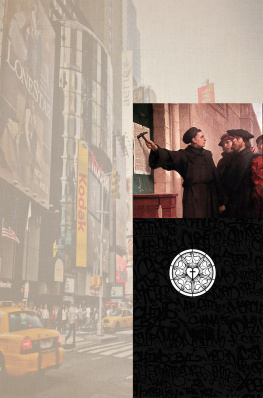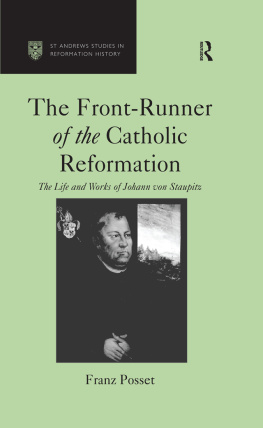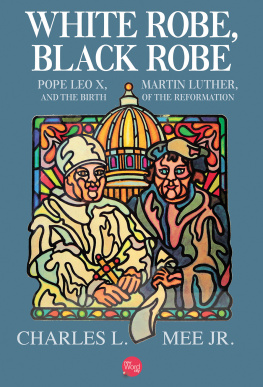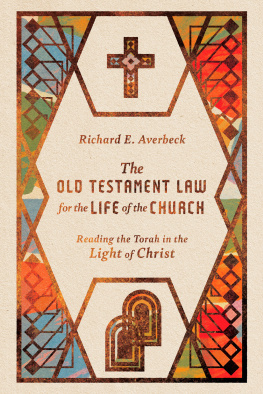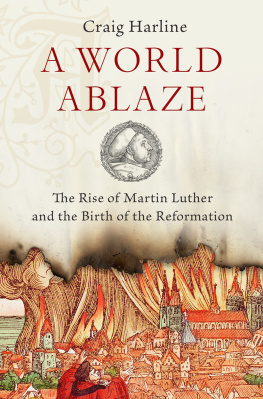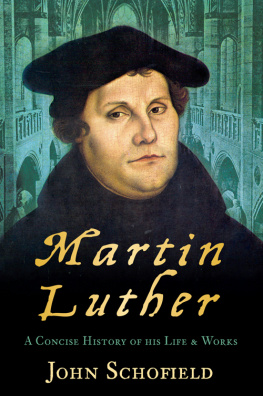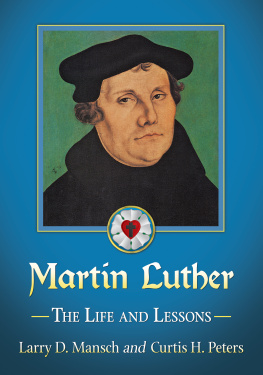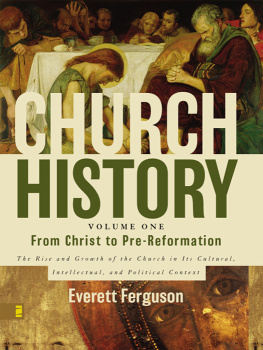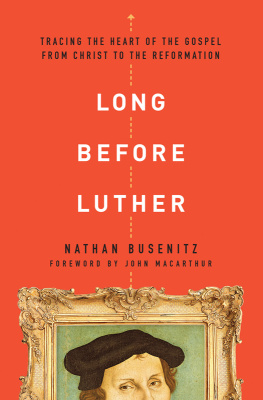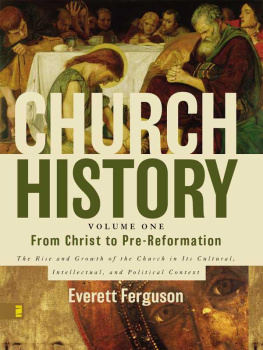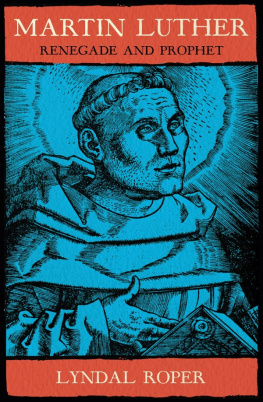Our Ninety-Five Theses: 500 Years after the Reformation AETH, 2016
All rights reserved
Our Ninety-Five Theses: 500 Years after the Reformation it has been edited by: Alberto L. Garca and Justo L. Gonzlez
Published by Asociacin para la Educacin Teolgica Hispana (AETH)
P.O. Box 677848
Orlando, FL 33867
www.aeth.org
No part of this publication may be reproduced, stored in a retrieval system or transmitted in any form or by any means, electronic, mechanical, photocopying, recording or otherwise, without prior permission of Asociacin para la Educacin Teolgica Hispana (AETH)
Interior design and cover design: Ivn Balarezo Prez
Editorial Services: Bestsellers Media
www.bestsellersmedia.com
19620 Pines Blvd, Suite 220
Pembroke Pines, FL 33027
786-502-0299
ISBN: 978-1-945339-05-9
eISBN: 978-1-945339-06-6
Hipertexto
Diseo de EPUB
J UST AS IN THE DAYS OF L UTHER , we are living in a world undergoing enormous changes in the social, political, economic, religious, cultural and technological arenas. As in the times of the monk from Wittenberg, these changes also challenge and force the Church to rethink and transform itself. This is so because today in North America, as in Europe five hundred years ago, the Church has lost credibility as the body of Christ and as a sign of the Kingdom of God in the world. A painful indication of this is that, in general, the major Christian traditions (Catholic, Protestant and Evangelical) for several years have experienced a gradual but steady decrease in the number of their members.
For this reason, the Association for Hispanic Theological Education (AETH for its name in Spanish) considers the publication of this book very relevant. This fifth centennial is about commemorating what happened five centuries ago as much as about reliving it in light of our own realities. And this we must do as universal Church, namely, according to perspectives and ecclesial experiences representative of the church in general and of the Hispanic church in particular. Thus, according to their own Christian traditions and from their different understandings of the historical and theological value of the Reformation, the authors invite all of us to propose our own 95 thesis.
The book reminds me of the orchestral piece Bolero of Maurice Ravel, in which melody and rhythm are heard from beginning to end, as two themes are constantly repeated throughout each of the chapters of this book. The first theme refers to the historical and theological events around the publication of the 95 theses proposed by Martin Luther. The second theme refers to the current reality of a vast majority of the Hispanic people and the Hispanic Church in this country; a reality characterized by marginalization, poverty, and discrimination. As in Ravels Bolero in which each instrument adds its particular sound, each chapter of the book adds a perspective, jointly evoking a crescendo that allows us to feel (and not only to think) those two themes in an inclusive and comprehensive manner.
With their own styles and in light of their own life experiences, the authors of the book invite us to appropriate the reforming and transforming spirit behind that simple yet radical act of nailing at the door of a church a paper with an agenda for discussion about the nature and purpose of the body of Christ in the world. They do it separately but also together, en conjunto, as it is customary to do theology among Hispanic people. Consequently, as in the orchestral climax of a musical piece, the book closes with a chapter that summarizes what the authors call our 95 theses , namely, the topics for discussion they want to propose to the Hispanic Church in the twenty-first century.
In a very particular way, this book is an invitation to the Hispanic Church not to forget what the authors state in our thesis 55 : we are not helpless victims, but Gods people called to be instrument of his grace, justice, and reconciliation. Therefore, it is our prayer and hope that this invitation will make us work so that the Church today, in all its expressions, will become a more faithful witness of the Gospel and of the prophetic message of Jesus Christ in the world in which we live.
Fernando A. Cascante
Director Executive, AETH
D EDICATION
To all believing Latino people, who sing, suffer, struggle and hope in the language of Cervantes, with the fervor of Teresa, the faith and trust of Luther, the valor of Cuauhtmoc, the boldness and resolution of Maceo, the vision of Mart and Hostos, and the wisdom of Sor Juana.
I N GRATITUDE
We want to express our heartfelt thanks to the institutions and individuals whose economic support has helped to publish this book:
The Center for the Study of Latino Christianity and Religions, Perkins School of Theology, Southern Methodist University, Dallas, Texas, and the Centers Director, Dr. Hugo Magallanes.
The Center of Hispanic Studies of Concordia Seminary , St. Louis, Missouri and its Director, Dr. Leopoldo A. Snchez M.
The Iglesia Cristiana (Discpulos de Cristo) of Puerto Rico , and its general pastors, the Reverends Esteban Gonzlez Doble and Miguel ngel Morales.
The Domestic and Foreign Missionary Society of the Episcopal Church , City of New York, and the Reverend Canon Anthony Guilln, Missioner for Latino/Hispano Ministry.
We also wish to thank: Dr. Catherine Gunsalus Gonzlez and Dr. Douglas Groll for their editorial assistance in this English edition.
In the first place, I ask that people make no reference to my name; let them call themselves Christians, not Lutherans.
What is Luther? After all, the teaching is not mine [John 7.16]. Neither was I crucified for anyone [1 Cor. 1.13]. Saint Paul, in 1 Corinthians 3, would not allow Christians to call themselves Pauline or Petrine, but Christian.
How then should I poor stinking maggot-fodder that I am come to have people call the children of Christ by my wretched name? Not so, my dear friends; let us abolish all party names and call ourselves Christians, after him whose name we hold I hold, together with the universal church, the one universal teaching of Christ, who is our only master [Matt. 23.8].
Martin Luther
A LBERTO L. G ARCA
I N 1992 I ASSUMED MY NEW POSITION as professor of theology at Concordia University Wisconsin. Concordia University had recently acquired a new campus at Mequon, Wisconsin, from the Sisters of Notre Dame. This campus had served for many years as a convent and regional quarters for this religious order. That very year, several retired sisters who had lived for many years on this property came for a visit. Their former Mother Superior also came along with this group. It so happened that at one time my office had been her office, where she administered the affairs of the order.
We engaged in a wonderful and friendly conversation, and detecting my Spanish accent, she asked where I was from. I told her that I was born in Cuba. She already knew that I was a Lutheran professor of theology and director of the lay ministry and diaconate program at the university. She asked, somewhat surprised: How is it possible that you are not a Catholic? She became even more amazed when I told her that I was raised Roman Catholic and that in Cuba we were practicing Catholics. How is it possible that you abandoned your mother church? she asked me. For this loving and sweet sister, it was more congruent for a Cuban like me to be a member of the Catholic Church. According to her way of thinking, as well as many other Catholics, becoming a Lutheran, Protestant, or Evangelical goes against all that is culturally valid for a Latino.

